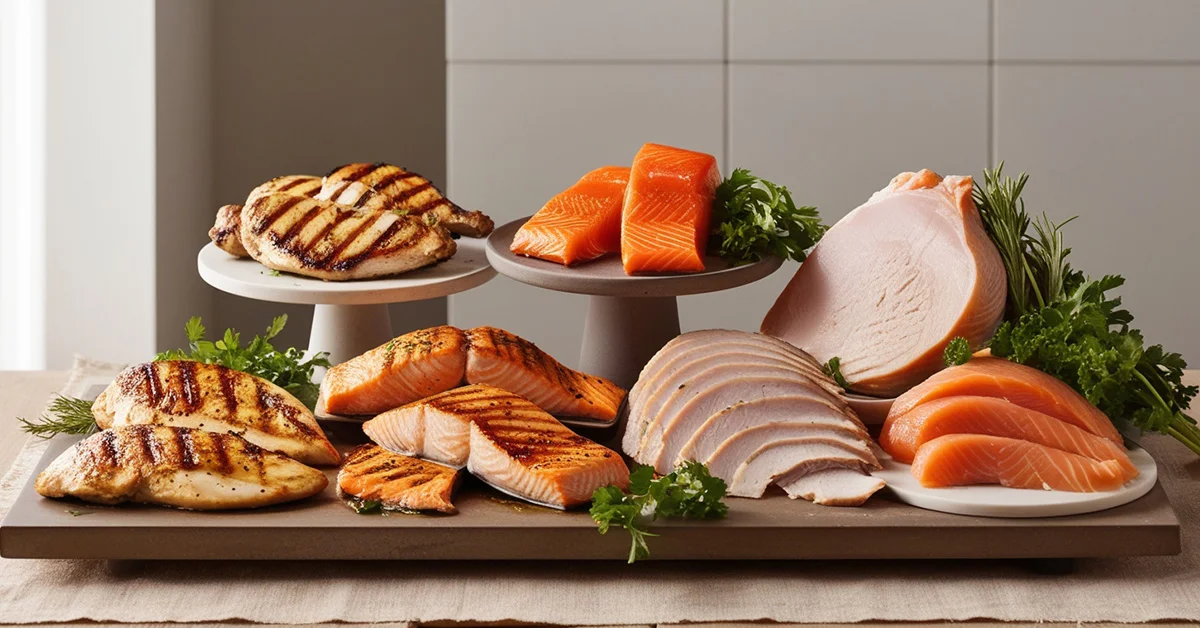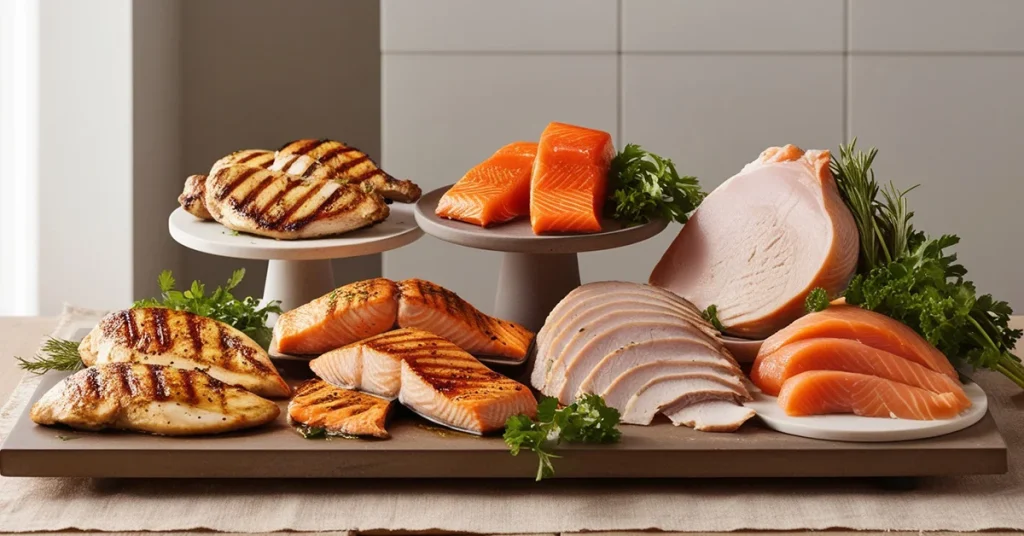Lean proteins play a crucial role in maintaining a balanced and vibrant lifestyle. They are essential for building and repairing tissues, producing enzymes, and supporting immune function. For anyone wondering, why are lean proteins important, the answer lies in their ability to deliver high-quality nutrition without the added burden of excess fat.
Incorporating lean proteins into your diet helps in several ways. They aid in muscle repair and growth, which is especially beneficial for active individuals. Additionally, lean proteins contribute to satiety, helping you feel full longer and reducing the urge to snack on unhealthy options. This makes them a cornerstone for weight management and energy balance.
The benefits extend beyond just physical health. Lean proteins, such as fish, chicken, and plant-based options like lentils, are packed with essential nutrients like omega-3 fatty acids and vitamins that support heart health and cognitive function. Their high protein-to-fat ratio ensures you get maximum benefits without unnecessary calories.
Ultimately, understanding why are lean proteins important encourages smarter dietary choices. By prioritizing these protein sources, you can fuel your body effectively, support long-term health, and lead an active, fulfilling lifestyle.

What To Eat To Lose Belly Fat In 1 Week
Top17 Best healthy foods to lose belly fat fast and feel great
- What is lean protein
- How Lean Proteins Differ from Other Protein Types
- Lean Proteins Meaning
- The Role of Protein in the Body
- Nutritional Benefits of Lean Proteins
- Lean Protein Foods for Weight Loss
- Non-Lean Protein: What You Should Know
- Why Are Lean Proteins Important for Weight Management
- Lean Proteins and Muscle Health
- Heart Health and Lean Proteins
- Lean Proteins for Energy and Stamina
- Lean Proteins for a Strong Immune System
- Incorporating Lean Proteins into Your Diet
- Lean protein vegetarian
- The Environmental Impact of Choosing Lean Proteins
- Common Myths About Lean Proteins
- Practical Tips for Buying Lean Proteins
- Cooking Tips for Lean Proteins
- Potential Risks of Excessive Protein Intake
- Combining Lean Proteins with Other Nutrients
- How Lean Proteins Contribute to Longevity
- FAQs
What is lean protein
Defining Lean Proteins
Lean proteins are food sources that provide high-quality protein with minimal fat. These include options like chicken breast, fish, and legumes. Why are lean proteins important? They help in building muscle, supporting metabolism, and maintaining a healthy weight, all while keeping fat intake low. Choosing lean proteins ensures you get the nutrients your body needs without the extra calories.
How Lean Proteins Differ from Other Protein Types
Unlike fatty proteins, such as bacon or marbled steak, lean proteins have lower fat levels, making them an excellent choice for those looking to maintain a healthy weight or reduce cholesterol. Additionally, processed proteins like sausages or deli meats often contain additives that lean, natural protein sources avoid.
Lean Proteins Meaning
Lean proteins are foods that provide a rich source of protein while being low in total and saturated fats. These proteins help your body grow, repair, and maintain muscle, All without contributing excess fat to your diet.
The Role of Protein in the Body
Why Protein Is Essential for Overall Health
Protein is vital for overall health as it helps build and repair tissues, supports immune function, and aids in the production of enzymes and hormones. Why are lean proteins important? They provide these essential benefits without excess fat, contributing to a balanced diet. Including lean protein in meals promotes muscle health, energy, and overall well-being.
How Protein Supports Growth and Repair
Protein plays a key role in the growth and repair of tissues throughout the body. It helps to rebuild muscle after exercise, heal wounds, and regenerate skin cells. Why are lean proteins important? They provide these benefits without the added fats, making them an ideal choice for repairing and maintaining your body’s tissues while supporting overall health.
Nutritional Benefits of Lean Proteins
High Protein, Low Fat: The Ideal Combo
A high-protein, low-fat diet is key to maintaining a healthy body. It supports muscle growth and repair while keeping your fat intake in check. Why are lean proteins important? They deliver the necessary nutrients without the excess fat, promoting a balanced, nutritious diet. This ideal combo can help manage weight, boost metabolism, and enhance overall well-being.
Packed with Essential Nutrients
Lean proteins are packed with essential nutrients that fuel your body. These nutrient-dense foods provide high-quality protein, vitamins, and minerals while keeping fat levels low. Why are lean proteins important? They support your overall health, enhance muscle growth, and boost energy. By incorporating these nutrient-rich foods, you’ll improve your diet and support long-term wellness.
Lean Protein Foods for Weight Loss
When trying to lose weight, the foods you choose make a big difference. Lean protein foods are a great choice for anyone looking to shed extra pounds while staying healthy. These foods are low in fat but rich in protein, helping you feel fuller for longer. This can help reduce hunger and cravings, making it easier to stick to your diet plan.
Benefits of Lean Protein Foods
Lean protein foods include options like chicken breast, turkey, fish, tofu, and beans. These foods give your body the protein it needs to build muscle and stay strong, but they are lower in calories and fat than fattier cuts of meat. Adding these foods to your meals can help you lose weight while still providing essential nutrients.
So, why are lean proteins important? The answer is simple: they help keep your body in balance. Lean proteins are satisfying and filling, meaning you won’t feel hungry as quickly after a meal. This helps you control your portion sizes and avoid overeating. Additionally, protein takes more energy to digest than fats or carbs, meaning your body burns more calories to process it. This natural calorie burn can speed up your weight loss journey.
Lean Protein Foods to Include in Your Diet
Here are some great lean protein foods to add to your diet for weight loss:
- Chicken breast
- Salmon and other fish
- Lean cuts of beef
- Tofu and tempeh
- Lentils and beans
- Greek yogurt
Incorporating these foods into your meals will give you the protein boost you need while keeping your calorie intake in check. By understanding why are lean proteins important, you can make smarter food choices that support your weight loss goals and help you stay healthy in the long run.
Benefits of Lean Protein Meats
Lean protein meats are not only great for building muscle and repairing tissues but also provide essential nutrients without adding extra fat. They are particularly beneficial for weight loss or maintenance because they help you feel fuller for longer, making it easier to stick to a balanced diet.
Incorporating lean protein meats into your meals can also support heart health by reducing your intake of saturated fats. This makes lean meats a smart choice for anyone aiming for a healthy, balanced diet.

Non-Lean Protein: What You Should Know
Non-lean proteins refer to protein sources that are higher in fat, particularly saturated fat. These proteins provide a good amount of protein but also come with a larger quantity of fats, which can contribute to excess calorie intake. Examples of non-lean protein sources include fatty cuts of beef, pork, lamb, and high-fat dairy products like full-fat cheese, butter, and cream. While these foods can still be part of a balanced diet, they should be consumed in moderation, especially if you’re working on managing your weight or heart health.
Characteristics of Non-Lean Protein
Non-lean proteins tend to be rich in saturated fats, which have been linked to an increased risk of heart disease when consumed in excess. While they do provide protein, they often come with more calories and less nutritional value compared to leaner sources. It’s important to understand that not all fats are bad—healthy fats from sources like avocados, nuts, and olive oil are beneficial, but excessive saturated fats from animal products can have negative health impacts.
How Non-Lean Proteins Affect Health
Consuming too much non-lean protein can lead to weight gain, especially if you don’t balance it with other healthy food choices. Over time, it may also increase your cholesterol levels and affect cardiovascular health. If you’re aiming for a healthier lifestyle or weight loss, it’s often recommended to choose leaner protein options.
In conclusion, while non-lean proteins do offer protein, it’s wise to be mindful of the fat content. Replacing them with leaner options like fish, chicken breast, and plant-based proteins can help maintain a healthy diet and support your overall health goals.
Why Are Lean Proteins Important for Weight Management
Boosting Metabolism with Lean Proteins
Why are lean proteins important? They play a key role in boosting metabolism! When you consume lean protein, your body works harder to digest it, increasing calorie burn. This helps with fat loss and supports your overall energy levels. Lean protein sources, like chicken and fish, help maintain muscle mass, keeping metabolism active and efficient.
Helping You Feel Fuller for Longer
Why are lean proteins important? They help keep you full for longer. Lean protein foods, like turkey or beans, digest slowly, stabilizing blood sugar levels. This keeps hunger at bay, reducing the temptation for unhealthy snacks. By adding lean proteins to your meals, you’ll feel satisfied and energized throughout the day, supporting better weight management and overall well-being.
Lean Proteins and Muscle Health
Building and Repairing Muscle Tissue
For athletes and gym-goers, lean proteins are a staple. They provide the necessary building blocks for muscle growth and help repair tissues after exercise-induced damage.
Preventing Muscle Loss with Age
As we age, muscle mass naturally declines—a condition known as sarcopenia. Consuming adequate lean proteins can slow this process and preserve strength and mobility.
Heart Health and Lean Proteins
Supporting Cardiovascular Health
Lean proteins play a crucial role in supporting cardiovascular health. They help reduce unhealthy fats and lower cholesterol levels, promoting a healthy heart. Why are lean proteins important? They offer the benefits of protein without the added saturated fats, keeping your blood vessels clear and your heart strong. Incorporating lean proteins into your diet can enhance long-term heart health.
Reducing Cholesterol Levels Naturally
Incorporating lean proteins into your diet is a natural way to reduce cholesterol levels. By choosing lean meats, fish, and plant-based sources, you avoid the saturated fats that contribute to high cholesterol. Why are lean proteins important? They provide essential nutrients while helping to balance cholesterol, improving overall heart health. This simple adjustment can lead to a healthier, happier life.

Lean Proteins for Energy and Stamina
Sustained Energy Throughout the Day
Lean proteins provide a steady stream of energy throughout the day, preventing those mid-afternoon slumps. By incorporating lean protein sources into your meals, you ensure lasting fuel for both body and mind. Why are lean proteins important? They help maintain stable blood sugar levels, keeping your energy consistent without the crash that often comes from high-carb meals.
Preventing Energy Crashes
Incorporating lean proteins into your diet helps prevent energy crashes. These proteins release energy gradually, ensuring you stay energized throughout the day. Unlike sugary snacks that lead to rapid spikes and drops in blood sugar, lean proteins provide steady fuel. Why are lean proteins important? They help regulate your energy levels, making you feel more balanced and focused without the dreaded crash.
Lean Proteins for a Strong Immune System
Boosting Immunity with Protein-Rich Foods
Proteins are essential for producing antibodies and immune cells, strengthening the body’s ability to fight off infections.
Fighting Infections More Effectively
With a steady intake of lean proteins, the immune system stays robust, reducing recovery time from illnesses and injuries.
Incorporating Lean Proteins into Your Diet
Best Sources of Lean Proteins
Lean protein options include poultry, fish, egg whites, and plant-based foods like quinoa and lentils. These foods are versatile and fit seamlessly into any diet.
Simple Meal Ideas Featuring Lean Proteins
Start your day with an egg white omelet, enjoy a chicken salad for lunch, and opt for grilled salmon with steamed vegetables for dinner. Snacks like roasted chickpeas or Greek yogurt are great too.
Lean protein vegetarian
Plant-Based Sources of Lean Proteins
Vegetarians and vegans can enjoy a variety of plant-based lean proteins, including lentils, chickpeas, edamame, tofu, tempeh, quinoa, and chia seeds. These foods are rich in protein and often provide additional nutrients like fiber and antioxidants.
Tips for Balancing Vegetarian Diets
Combining different plant-based proteins, such as rice and beans, ensures you get all essential amino acids. Adding nuts and seeds to meals boosts protein content while enhancing flavor and texture.
The Environmental Impact of Choosing Lean Proteins
Sustainable Protein Choices
Selecting sustainably sourced proteins, such as wild-caught fish or plant-based options, can significantly reduce environmental harm. These choices promote ecological balance and help conserve natural resources.
Reducing Your Carbon Footprint
Plant-based proteins, in particular, have a lower carbon footprint compared to meat production. By incorporating more of these foods, individuals can contribute to global sustainability efforts while enjoying nutritious meals.
Common Myths About Lean Proteins
Debunking Misconceptions Around Lean Proteins
Some people believe lean proteins are bland or less satisfying than fattier options. However, with proper preparation, lean proteins can be incredibly flavorful and just as enjoyable.
Addressing Concerns About Protein Deficiency
Another common myth is that lean protein sources can’t meet daily protein needs. In reality, even plant-based options provide ample protein when consumed in adequate quantities.
Practical Tips for Buying Lean Proteins
What to Look for at the Grocery Store
When shopping, prioritize fresh, minimally processed proteins. Look for cuts labeled “lean” or “extra lean” and avoid products with excessive additives or sodium.
Avoiding Processed Protein Pitfalls
Steer clear of heavily processed items like breaded chicken or flavored protein snacks. While convenient, these products often contain unhealthy fats, sugars, and preservatives.
Cooking Tips for Lean Proteins
Healthy Ways to Prepare Lean Proteins
Grilling, steaming, baking, and poaching are excellent ways to cook lean proteins without adding unnecessary fats. Use nonstick pans or cooking sprays to minimize oil usage.
Flavorful Recipes Without Extra Fat
Enhance the taste of lean proteins by marinating them with herbs, spices, and citrus juices. Garlic, rosemary, paprika, and lemon are fantastic options for creating depth of flavor.
Potential Risks of Excessive Protein Intake
Knowing When Enough Is Enough
While protein is essential, consuming excessive amounts can strain the kidneys and lead to imbalances in other nutrients. It’s important to follow recommended dietary guidelines.
Maintaining a Balanced Diet
Balance is key. Pair lean proteins with vegetables, whole grains, and healthy fats to ensure a well-rounded diet that meets all nutritional needs.
Combining Lean Proteins with Other Nutrients
Why Pairing Protein with Fiber Matters
Combining proteins with fiber-rich foods, like vegetables and whole grains, promotes better digestion and enhances satiety. This pairing also helps regulate blood sugar levels.
The Importance of a Diverse Plate
Diversity in meals ensures a wide range of nutrients. Including lean proteins, colorful vegetables, and healthy fats creates a plate that is both nutritious and visually appealing.
Special Considerations for Athletes
Tailoring Lean Protein Intake for Performance
Athletes often require more protein to support muscle repair and energy needs. Lean proteins are ideal for providing the necessary nutrients without the drawbacks of high-fat alternatives.
Recovery and Endurance Benefits
Post-workout meals with lean proteins, such as grilled chicken or a protein smoothie, aid recovery and improve endurance, allowing athletes to perform at their best.
How Lean Proteins Contribute to Longevity
Supporting Healthy Aging with Protein
Lean proteins help maintain muscle mass and bone density, both of which are critical for healthy aging. They also reduce the risk of frailty and improve quality of life in older adults.
Reducing the Risk of Chronic Diseases
High-quality proteins from lean sources can lower the risk of chronic conditions like diabetes, heart disease, and obesity, paving the way for a longer, healthier life.
Conclusion
Recap of Why Lean Proteins Matter
Lean proteins are a powerhouse of nutrition, offering numerous benefits such as weight management, muscle health, heart support, and sustained energy. They are versatile and can fit into any lifestyle or dietary preference.
Encouraging Healthy, Balanced Eating Habits
Incorporating lean proteins into your meals is an easy and effective way to enhance your health. Pair them with diverse, nutrient-rich foods to enjoy a vibrant and balanced diet that fuels your body and mind.
FAQs
Why is lean protein important?
Lean protein is crucial for a balanced and healthy diet because it provides essential amino acids needed for muscle growth, repair, and overall body function, without adding excessive fat. It helps maintain a healthy weight by supporting lean muscle mass, boosting metabolism, and keeping you fuller for longer, which reduces overeating.
Why protein is important in fat loss?
Protein is vital in fat loss as it helps preserve lean muscle mass, which plays a key role in burning fat. High-protein foods increase satiety, reducing hunger and cravings. Protein also has a higher thermic effect, meaning your body burns more calories digesting protein than fats or carbs, making it a great tool for weight management and fat loss.
What is the difference between lean protein and regular protein?
The main difference between lean protein and regular protein lies in the fat content. Lean protein sources, such as chicken breast or fish, contain less fat compared to regular protein sources like fatty cuts of beef or pork. This makes lean proteins a healthier choice, especially for those looking to manage weight, maintain muscle mass, or support heart health.
What are the benefits of lean whey protein?
Lean whey protein is a high-quality protein source that supports muscle growth, recovery, and fat loss. It is easily digestible and contains all nine essential amino acids. Whey protein can help boost metabolism, control appetite, and support muscle preservation during weight loss, making it ideal for fitness enthusiasts and anyone looking to maintain a healthy body composition.
Are eggs lean protein?
Eggs are a versatile and nutrient-rich protein source, but they aren’t considered “lean” in the strictest sense, especially if you consume the yolk. The egg white, however, is a lean protein, providing high-quality protein with minimal fat. To keep your intake lean, you can opt for egg whites or use whole eggs in moderation.








